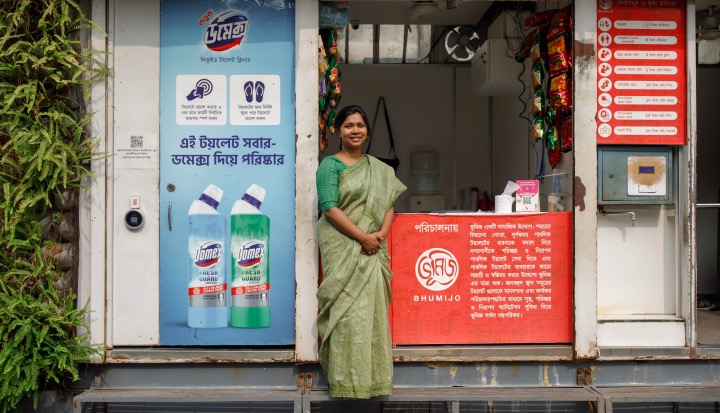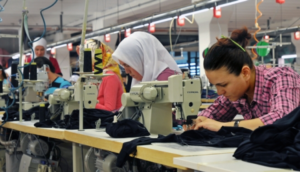More than two billion people around the world still lack access to safe water and sanitation facilities. When these services are unavailable, people rely on unsafe sources of water such as rivers, ponds, and water bodies shared with animals for drinking, cleaning, and other daily tasks. With no available toilets, many must practice open defecation, which increases the risk of contaminated water. Drinking unsafe or contaminated water can contribute to outbreaks of infectious diseases like cholera, hepatitis, and typhoid, and more intangible challenges including negative effects of stigma and fatigue on individual self-esteem, dignity and productivity.
Water and sanitation focused small and medium enterprises (SMEs)—local private businesses that usually supplement government public services in rural and hard-to-reach areas—are already helping to fill a critical gap by providing infrastructure like pipes and toilets, products such as soap and chlorination tablets and services such as repair and maintenance, water distribution, and waste disposal in underserved areas. This is essential, but the impact of improved infrastructure can be accelerated.
By reinforcing behaviours related to the need, approval, correct use, and maintenance of the hygiene products and services that they offer, SMEs can play a key role to enable healthy water, sanitation, and hygiene (WASH) behaviours.
Through collaboration between the TRANSFORM initiative—led by Unilever, the UK’s Foreign, Commonwealth & Development Office (FCDO), and EY—and the Johns Hopkins Center for Communication Programs (CCP), recent research explored how WASH-focused SMEs can leverage behavioural science to deepen their impact by increasing people’s understanding of the value of potentially lifesaving safe water and related hygiene behaviours around handwashing, food handling and disposal of waste.
Effective behaviour change requires tailoring interventions to specific contexts. Socio-cultural norms, family dynamics, and gender roles all influence access to and use of WASH products and services. SMEs should conduct formative research, including network and relationship mapping, to identify influential voices within their communities. These individuals can act as champions for change, sharing information and encouraging new behaviours and norms.
SMEs should also recognize the barriers to behaviour change, such as entrenched social practices or misconceptions about WASH products and services. By addressing these challenges through targeted communication and education, SMEs can foster trust and encourage consistent use of their services.
Integrated within communities, SMEs have unique advantages in promoting behaviour change. Their understanding of local needs, barriers, and social dynamics enables them to build trust and foster relationships with customers, positioning them as both service providers and change agents.
For example, in Ghana, our research identified tenants of residential houses and religious leaders as having high influence on the use of WASH products and services. In South Africa, Loowatt, a waterless toilet company, prioritised engaging with ward councillors and committee members to better understand their customers’ needs and enable the launch and rollout of their toilet facilities. Then they hired sales and service providers within the local community to build trust and increase interactions with users. In just one community, Loowatt now provides 100 toilets, ensuring more than 350 people have cleaner, safer sanitation.
Behaviour change strategies also help SMEs create demand for their products. When communities adopt healthier habits, they advocate for more WASH infrastructure and services, generating a self-reinforcing cycle of improved health and business growth. For instance, promoting toilet use among women and girls could lead to increased demand for other hygiene products, creating new market opportunities.
Communication is essential for driving behaviour change. Beyond sharing information, effective communication builds relationships between SMEs, customers, and community stakeholders. It increases trust in the SME, sparks interest in its services, and motivates people to adopt healthier habits.
For instance, SMEs can leverage past customers as community influencers to advocate for their products. Our research in Ghana showed that these groups had the greatest reach and influence over potential new customers. Sixty-three percent of customers reported that they had discussed and/or showed their purchased toilet to others. In addition, 83 percent of participants reported intentions to purchase a toilet after a discussion about WASH with a past customer of an SME, and 32 percent reported they had purchased a toilet.
Imagine an SME encouraging landlords to install toilets and safe water sources by emphasizing the financial and social benefits. The potential ripple effect could transform hygiene practices across entire communities.
Behaviour change isn’t just for customers—it’s also vital for SMEs themselves. To drive long-term impact, SMEs should rethink their business models to prioritize customer relationships alongside market strategies. This involves creating lasting connections with customers that extend beyond immediate transactions.
For example, SMEs should integrate systems to track and evaluate behaviour change alongside financial performance. Key indicators could include knowledge, adoption, and satisfaction with WASH services. Such data enables SMEs to refine their approaches and measure progress toward both business and public health goals.
By encouraging community discussion and engagement on WASH challenges, understanding and influencing behaviour and shaping customer interactions to foster loyalty, SMEs can promote safe and healthy practices aligned with their business goals, creating a positive cycle that boosts both community health outcomes and business growth. This is a win for businesses and, most importantly, for the people they serve.









